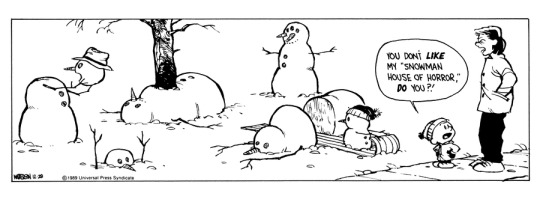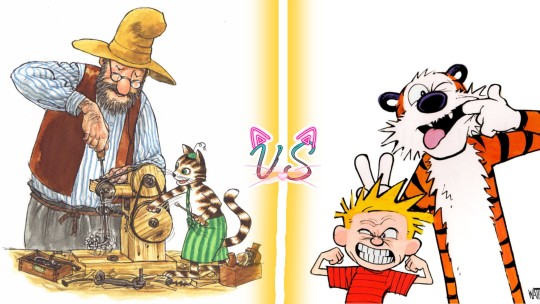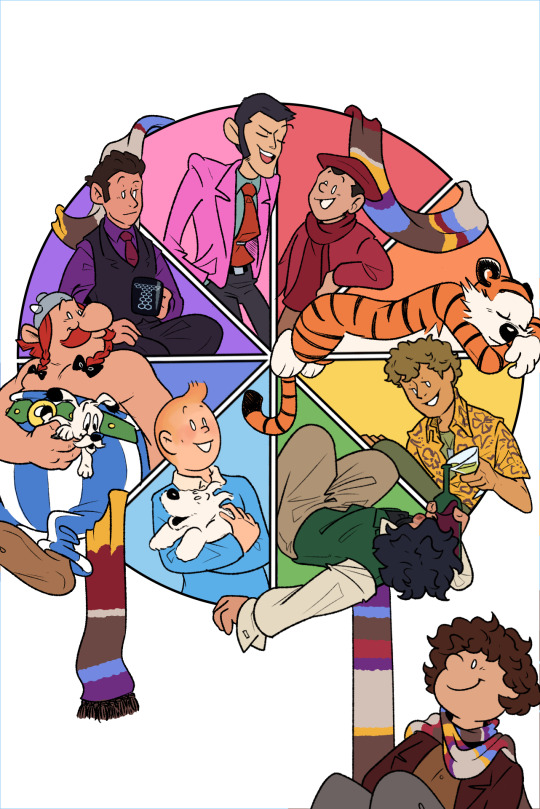#Hobbes
Explore tagged Tumblr posts
Text
I grew up reading Calvin & Hobbes, and one of my favorite running jokes was the snowmen that Calvin would build.










#calvin and hobbes#calvin#hobbes#susie#mom and dad#snowman#snowmen#bill watterson#comic strip#funny#dark humor#sharks#chicken#bowling#ice cream#winter
5K notes
·
View notes
Text

Flashback to nursing Hobbes. It was a long journey with a lot of ugly medications.
Such a tiny little guy that refused to give up!
Now he is too smart, to active, to pushy, and still too cute! 🥰
2K notes
·
View notes
Text

422 notes
·
View notes
Text

Happy Threshold Day!!!!! I hope everyone has a marvelous day full of lizards and pepperoni pizza. <3
Wanted to do a little piece inspired by the beta canon short story "On the Rocks" this year. :)
#janeway naming neelix in her head: hobbes :)#theyre so fun to draw i love lizard family <3#i am so thankful for u all thanks for sticking with me and my threshold content for so many years!!!#My Art#Threshold#AU#Star Trek: Voyager#Kathryn Janeway#Thomas Paris#Philippa Janeway#Edward Janeway#Amelia Janeway#Neelix#Hobbes#Human#Guardian#On the Rocks#Threshold Day
137 notes
·
View notes
Text

του Bill Watterson
279 notes
·
View notes
Text

I have an ideal Reaver's Mansion scenario in my mind, and it involves having Ben Finn there, being able to dance with either Page or Ben Finn if you wish, and lots of battle banter where everyone is getting on everyone's nerves :)
#art#my art#ben finn#page#cassandra#fable#fable 3#hero of brightwall#queen of albion#hobbes#reavers mansion#hobw
91 notes
·
View notes
Text

Feline Gathering
#sketch#doodle#artists on tumblr#dandadan#turbo granny#garfield#wisp the cat#tom cat#tom and jerry#hello kitty#calvin and hobbes#hobbes#undertale#temmie#azumanga daioh#pokemon#jigglypuff#big the cat#sonic the hedgehog#gumball watterson#the amazing world of gumball#nyan cat#pusheen the cat#morgana#persona 5#crossover#fanart#crossover art#crossover fanart
93 notes
·
View notes
Text





obviously Linus Van Pelt would be a tough act to follow
#but luckily he and susie are NOT into each other. they're just pals#not that calvin would ever understand that#calvin and hobbes#hobbes#hobbes the tiger#calvin watterson#calvin#fanart#comic#doverstar's art#fan art#bill watterson#calvin & hobbes#calvin x susie#peanuts#peanuts linus#linus#linus van pelt#peanuts comics#charlie brown#charlie brown comics#susie derkins#susie#calvusie#calvin/susie#susie/calvin
98 notes
·
View notes
Text
Round 6 (quarterfinals)
Findus (Pettson and Findus) vs Hobbes (Calvin and Hobbes)

#this feels like an American vs European childhood kinda poll oh well#best fictional cat#polls#cats#competitions#pettson och findus#pettson and findus#calvin and hobbes#hobbes
718 notes
·
View notes
Text

I wanted to try that colour wheel meme! I think the Doctor gets to count as a bit of a wild card...
#colour wheel meme#les mis#grantaire#mash#trapper#asterix#obelix#tintin#calvin and hobbes#hobbes#torchwood#ianto#lupin iii#hogan's heroes#lebeau#4th doctor#doctor who#trapper and grantaire don't understand a word the other is saying but they're vibing#depressed alcoholic who desperately wants to avoid fighting and use dark humour to cope... which am i describing#this was a lot of fun... i might do another one at some point and generate it by whatever suggestions you guys give me#see how weird we can make the mix#my art
413 notes
·
View notes
Text

45 notes
·
View notes
Note
Hi. I can't help but notice that you are a Tumblr bot that is written in python and able to make polls.
Would you mind explaining how you did this please?

(creator added: I copy paste all the posts from the machine to tublr)
#randomly generated tumblr posts#randomly generated posts#programming#gimmick blog#gimmick account#into the gimmickverse#python script#python#calvin and hobbes#hobbes#calvin & hobbes
48 notes
·
View notes
Text

Hobbes never Rests! He’s knocked my glasses to the floor, now he’s patting my water tumbler like he’s gauging how much force it will take to fling it to the floor! Always looking for mischief! Today he helped me mend a top, turned a 10 minute job into a 90 minute circus! 👀😜😄😵💫🤪🤡
50 notes
·
View notes
Text
being an old ap kid and now an honors college kid means that all the books you read in highschool are still the same ones you're reading now
#nezu speaks#mary shelly will never let go of me i fear#and its funny bc as a polisci person you have to know locke#hobbes#rousseau#etc#and we read all their stuff in senior year 💔💔#i need variety pls
34 notes
·
View notes
Text
Fahrenheit 451, Hobbes, and Hunger Games Interviews
I’ve been stuck on Hobbes ever since my last post. Even more so, I’ve been stuck on this video from Unsolicited Advice about Ray Bradbury’s Fahrenheit 451. I’ve watched it so many times, but each time I come away with another reflection between Snow’s rule and Beatty, or more largely, the government in Fahrenheit 451 and the capitol.
One of the most dangerous things to a hobbesian society is differing opinions. It’s a fear-rooted ideology. As Beatty in Fahrenheit explains:

“Better yet, give him none.” In Bradbury’s case, the introduction of different ideas to the public would cause a societal collapse.
Which is why the pre-game interviews are so jarring to me.
Why would the government give a platform to people it is going to kill? The tributes can use that time to say anything they want. They can rave about how cool it is to be there, as Cato does. They can pitch their skills, as foxface does, or they can charm the capitol audience, like Peeta does. Yet, none of the tributes in the first book use their time to criticize the government.
Why would the capitol give the tributes a live audience, when they could shout blasphemous, anti-Snow remarks? Because they know they won’t. Because fundamentally, they cannot.
Because, in the grand scheme of things, the games are inevitable, and the tributes’ only hope at winning is the mass staring them in the face, void of empathy, void of compassion, and lusting for blood.
First, let’s examine how Bradbury details interpersonal relationships.
In Fahrenheit 451, Mildred’s friend’s husband is going off to war. When Montag asks why she doesn’t seem to care, she explains he’s her third husband, and she can find a new one if he doesn’t return.

Likewise, the people of the capitol often pick favorites from the interviews. They likely know their favorites won’t return, yet they choose anyways.

The favor the tributes earn will disappear as fast as the friend’s thoughts of her husband. The tributes are replaceable. They will be replaced next year, so who cares if your husband dies in the war? There will be another.
Not only do the tributes depend on the interviews for sponsors, but they are disarmed the moment they are reaped. The capitol knows more than them, and they are immediately aware of that fact.
Once Montag begins to feel as if he knows something is fundamentally wrong with the way his world operates, he is almost immediately confronted by Beatty, who talks circles around him. In this confrontation, Montag realizes he does not have the words or skills to express why Beatty is wrong. Montag simply does not have the resources to argue back. He is unable to target the glaring issues with Beatty’s arguments and thus feels intimidated.
We see this in The Hunger Games in a few different ways. The people of the capitol are colorful and vibrant. The infrastructure is worlds ahead of district 12’s, to the point where Katniss is so excited by an elevator she considers asking to ride it again.
To be removed from one’s environment is already a disruptive experience. To be placed in a world that you quite possibly could not even imagine, is disarming and intimidating. The government, then, is prevalently more powerful than the displaced tribute. The buildings tower over them. The outfits are large and colorful. They are already intimidated.
Therefore, asking a young tribute with stage lights glaring in their wide eyes and Caesar Flickerman’s million-watt smile a few feet away to decry how unfair it is to be killed at the hands of the capitol is so unlikely, so improbable, that the capitol knows it won’t happen. Because it can’t.
It’s why in Catching Fire, Peeta’s “if it weren’t for the baby,” is so impactful. Despite the differences in culture, there are two commonalities in Peeta’s statement that transcend the borders and ideologies of Panem: love and family. For a moment, the capitol citizens begin to see the tributes as human, not their soon-to-die-in-the-war husbands.
Like Bradbury, Collins knows preaching at the masses like Johanna and Montag do is not enough to change their minds. Sometimes, the utmost rebellion is showing someone a mirror.
Sometimes, it’s empathy.
#peeta mellark#katniss everdeen#katniss and peeta#thg#the hunger games#catching fire#mockingjay#fahrenheit 451#ray bradbury#susan collins#thg meta#hobbes#guy montag#haymitch abernathy#sunrise on the reaping#the ballad of songbirds and snakes#thg sotr#tbosas#johanna mason#hunger games#thg series#thg katniss#peeta
25 notes
·
View notes